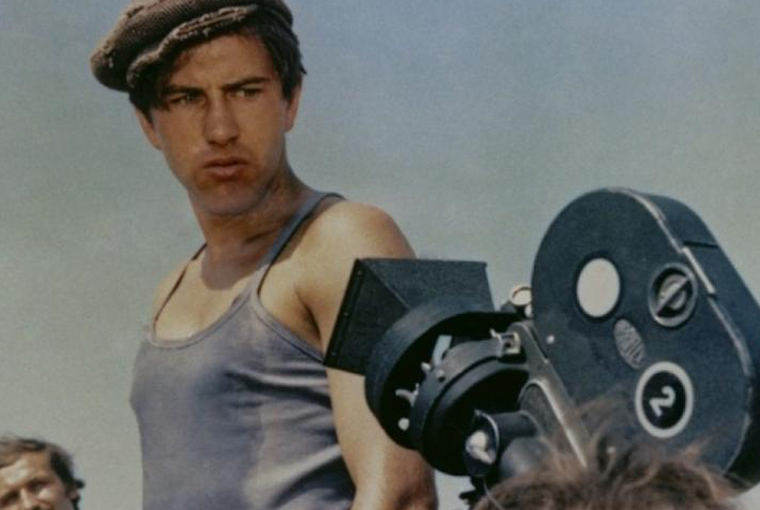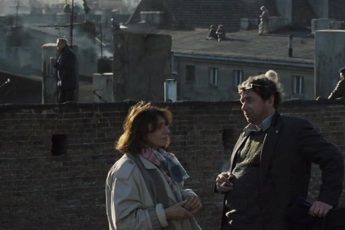Fruits of Labor: The Beginning of The Cinema of Moral Concern
Andrzej Wajda’s Man of Marble (Czlowiek z marmuru, 1976)
Vol. 10 (October 2011) by Stefania Marghitu
Although Andrzej Wajda first wrote the screenplay for Man of Marble in the early 1960s, it is hard to imagine the film’s intrepid protagonist without her quintessential 1970s bell-bottoms and heels. A beautiful leggy blonde, she is not far off from being Charlie’s fourth angel when generic disco theme music accompanies her actions. Perhaps Wajda chose to disguise his heroine of “The Cinema of Moral Concern” as a striking woman to distract censors from the depth of her character. But her moral engagement – searching for the truth in a truth-thwarting environment – still prevails, despite her seeming superficiality. (Or, perhaps, the director wanted to create a story reminiscent of Agnieszka Holland’s early career).
The twenty-something film student Agnieszka is introduced as unapologetic and abrasive, not afraid to straddle a statue of the subject of her thesis project, as she captures footage of dusty memorabilia in a Warsaw art museum. Her modernity is also established early on when she is shown arguing with a member of her crew over the use of a tripod, stating they will only use handheld shots and wide lenses, “just like in the new American films.” And like an American go-getter, she cleverly uses her beauty to get male attention.
While she is a quintessential modern woman, her main interest is finding the truth in Poland’s past to make sense of its present. She is frequently told that a film about the 1950s has yet to be made, and is then asked if she is interested in making an honest work about this distorted era. She even admits that the time period is ancient history. While those that lived through it would rather forget and move on, her unrelenting determination breaks down the countless barriers she crushes. Krystna Janda, whose role as the film’s heroine was also her first, contributes to the exceptionally thrilling nature of filmmaking that Wajda creates.
The rich historical layering presented throughout Man of Marble echoes the core of the “Polish Cinema of Moral Concern.” Agnieszka is battling a country that refuses to accept its past, and thus cannot learn from its repeated mistakes. And as Agnieszka and her subject’s story unfold, a generational parallelism is established between the two leading roles, the idealist and the young woman. Twenty-five years apart, both Agnieszka and Birkut are thrilled by the promise of a new steel compound that will result in a prosperous Poland. And just as Agnieszka is a symbol of a new generation of idealistic intellectualism, Birkut represents the rise and fall of Socialistic Idealism of his time. Both seek to make a change in their country by succeeding in their careers. Mateusz Birkut is a fresh-faced, provincial bricklayer. Among thousands of others just like him, he goes to work on the construction of a new city outside of Krakow, Nowa Huta. We first see him in an outtake in his beginnings as a bricklayer. He and his comrades are only given a fish after a day of manual labour, representing the food scarcity and general poverty of the time. Indeed, times were so tough that the masses needed to believe in improvement…
Later, another propaganda film that illustrates Birkut, positions him as a national treasure. His screen test is not unlike that of a Hollywood actor before his rise to success. “Building A New City” feeds the idea that hard work and ambition can land any young Pole a life of happiness. Birkut is shown with his future wife at a 1950 New Year’s Eve Ball before they are given their own flat, overlooking the other blocs the young couple built with their own hands. An ideal citizen and comrade, he is shown working, studying, and enjoying the fruits of his labour. At the time of its release, the semi-fictional film was a turning point for Birkut, as well as for the now famous director who discovered him. Agniezska now approaches the director that became fascinated with the bricklayer. He mocks Agniezska for her idealism and her thin, overambitious plan. He tells her that documentary footage, interviews, and cinema verité are all old tricks that have been done before. The director is the first of many people Agnieszka encounters from Birkut’s past who have erased the past from their individual and collective memories. This is of course one way of establishing a comfortable and secure life in order to be able to conform to the Socialist dogmas.
At the peak of his success, Birkut was a national treasure who, supposedly, could do no wrong. Others turned to him as a leader for the very same reasons Agnieszka’s crew becomes so loyal to her vision. As her film develops, Agnieszka is frequently told she is lacking one essential element: Birkut. Her unfinished film lacks a resolution or ending. Not surprisingly, it is as if he has disappeared. Finding an address, much less landing an interview, seems impossible. Because Birkut is naïve and innocent, his fall is inevitable. He was never a power-hungry opportunist and lacked arrogance, which were some of the defining characteristics of the long lasting leaders of Socialism. Following the disappearance and imprisonment of his friend, Birkut becomes obsessed with liberating him, only to be condemned to jail and left jaded and disillusioned by the failed Stalinist six-year plan. The masses still turn to him for guidance and hope, but he has become a fallen hero. Agnieszka may very well not want to find him.
Like his protagonist, Wajda also needed to finish his story. His film within a film marked a new era in cinematic history, and any new art form comes off as loose and unstructured in its nascent period. Wajda shifted from Social Realism to Moral Concern, and it took him nearly 15 years to release Man of Marble. He used the film as a channel to express everything he could not blatantly proclaim about the state of Poland. This is the director at his boldest, most ambitious, and thought-provoking. More than anything else, passiveness is the greatest crime committed in Man of Marble. Those who disregard the actions of the tyrannical and the corrupt are considered equally at fault. This cannot be entirely true when one lived in a country that can imprison, torture and kill people who dissent. Moral concern does not always result in moral action, but we must always consider the facts and seek the truth. And in this case, we must be grateful that 15 years did not prevent Wajda from releasing Man of Marble.




Leave a Comment